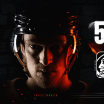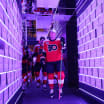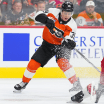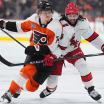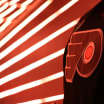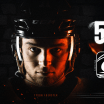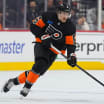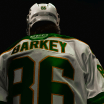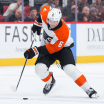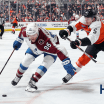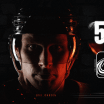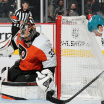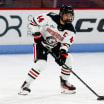September 7, 2021, marks 10 years since the tragic plane crash in Yaroslavl, Russia, that took the lives of Brad McCrimmon and the entire Lokomotiv team on its way to its KHL regular season opener in Riga, Latvia. The 52-year-old McCrimmon was to have made his professional head coaching debut after many years as an NHL assistant coach.
Remembering the Beast and the Count
Today, PhiladelphiaFlyers.com looks back fondly at the careers of "the Beast" and "the Count".
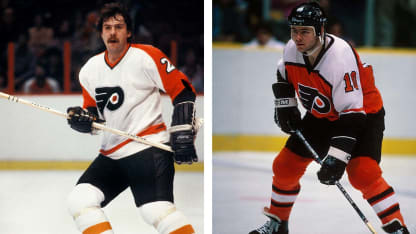
This day also marks five years since the passing of Bob Dailey at age 63. After a long battle with cancer, Dailey died at his home in Windemere, Florida. The 2016 year was an especially tough one for the Flyers family. Flyers co-founder and longtime chairman Ed Snider as well as Flyers Hall of Fame forward Rick MacLeish also passed away that year.
Today, PhiladelphiaFlyers.com looks back fondly at the careers of "the Beast" and "the Count". Both players were pivotal to the success of their Philadelphia teams, including runs to the 1980 Stanley Cup Final in Dailey's case and the 1985 and 1987 Cup Finals with McCrimmon.
Brad "the Beast" McCrimmon
Brad McCrimmon was born March 29, 1959 in Dodsland, Saskatchewan. Drafted by the Boston Bruins in the first round (15th overall) of the legendary 1979 NHL Draft, the 5-foot-11, 185-pound Brandon Wheat Kings defenseman broke into the NHL with the Bruins until being traded to the Flyers in a one-for-one deal for goaltender Pete Peeters on June 9, 1982.
McCrimmon went on to spend five seasons with the Flyers. The first two seasons were inconsistent, but things gelled when Mike Keenan was hired as the Flyers coach and created a new defense pairing of McCrimmon with future Hall of Fame defenseman Mark Howe. Previously, Howe's primary partner was Glen Cochrane.
As a tandem, "the Beast" and Howe formed arguably the best blueline pairing in franchise history as well as the top pairing in the NHL for the three years they were together. Howe and McCrimmon brought out the best in one other, and the duo excelled at both ends of the ice.
McCrimmon turned into one of the top shutdown defensemen in the NHL, but playing with the supremely skilled Howe also meant more offensive chances.
In 1984-85, McCrimmon posted 43 points and won the Barry Ashbee Trophy as the Flyers' best defenseman. The next year, he attained a career-high 13 goals and 56 points. In 1986-87 McCrimmon produced 10 goals and 52 points despite missing nine games.
Over the three-year period they played together as a pairing, McCrimmon was a combined plus-180 and Howe was plus-193. During the 1985-86 season, Howe was a staggering plus-85 and McCrimmon was plus-83. The next-best Flyers defenseman in that department was Brad Marsh at an even plus-minus for the season. The rest were minus-rated at even strength that season.
On a routine basis, Keenan used to play the Howe and McCrimmon pairing upwards of 30 minutes per game. There were even nights where they handled a 35-minute workload. Howe was the top runner-up for the NHL's Norris Trophy (best defenseman) in both 1985-86 and 1986-87, losing out to fellow Hall of Famers Paul Coffey and Ray Bourque.
McCrimmon had contract disputes with the Flyers in each of his two final seasons with the team. After the 1986-87 season, the Flyers traded McCrimmon to the Calgary Flames on August 26, 1987 for a 1989 1st-round pick (later transferred to Toronto in the deal that brought backup goaltender Ken Wregget to Philadelphia) and a 1988 3rd-round pick (goaltender Dominic Roussel).
Years later, Flyers general manager Bob Clarke admitted the McCrimmon trade to Calgary was a mistake. For several more seasons, McCrimmon continued to be among the most feared shutdown defenders in the league and helped Calgary win a Stanley Cup in 1989. Selling way too low on McCrimmon's value also left a hole in the Flyers blueline that proved very difficult to fill.
McCrimmon continued to play in the NHL until the 1996-97 season. As a member of the Detroit Red Wings, he was reunited as teammates with free agent signee in 1992-93 although they no longer regularly played regularly together as a defense pairing. After going to the Hartford Whalers the next season, McCrimmon was an early mentor for highly touted Hartford prospect Chris Pronger.
Following his retirement as a player, McCrimmon embarked on a lengthy coaching career. As an NHL assistant coach, he made stops with the New York Islanders, Calgary, Atlanta Thrashers and Detroit.
In 2011, the KHL's Lokomotiv Yaroslavl recruited the 52-year-old McCrimmon to be the club's head coach. He was excited at the opportunity for his first pro-level head coaching opportunity.
In an unspeakable tragedy that grabbed worldwide attention, Brad McCrimmon and the entire team perished in a Sept. 7, 2011 plane crash when the airplane slated to carry the team to its regular season opening game in Minsk, Belarus, crashed very shortly after takeoff.
At the suggestion of McCrimmon's close friend and longtime defense partner Howe, all of the players on the Flyers Alumni team wore No. 10 memorial patches on their jersey sleeve during the Winter Classic Alumni Game at Citizens Bank Park on Dec. 31, 2011.
Brad McCrimmon was survived by wife Maureen, daughter Carlin and son Liam.
Bob "the Count" Dailey
Bob Dailey was born in Kingston, Ontario, on May 3, 1953. Years before the likes of Al MacInnis and Rob Blake gained fame and fortune with their blistering right-handed slap shots, Dailey terrorized NHL goaltenders with deadly accurate 100 mile-per-hour blasts from the point.
A two-time winner of the Barry Ashbee Trophy as the Flyers' best defenseman, Dailey possessed a rare combination of imposing size (6-foot-5, 220 pounds), remarkable agility and an occasional mean streak that also carried him to a pair of NHL All-Star Game selections and a Vancouver Premier's Trophy as the Canucks' best defenseman.
During the prime of his career, "the Count" was among the best offense-contributing defensemen in franchise history. During his Flyers career, Dailey averaged two points for every three games played and recorded a 21-goal season during his first full year in the orange and black.
Unfortunately, a series of injuries, including major shoulder and knee injuries, curtailed Dailey's effectiveness. When reasonably healthy, Dailey was a heavy body checker as well as an offensive force. He often played at far less than 100-percent, which made his career seem sporadic and inconsistent to those who were unaware of his physical struggles. Even in his All-Star seasons, Dailey was subject to such lofty expectations that he was sometimes unfairly branded an underachiever.
Dailey's injury woes culminated with a shattered ankle suffered in November of 1981. The injury ended the Count's NHL career at the age of 28 - an age most defensemen are hitting the prime of their careers.
"It's not often as a coach that you have a defenseman who can change a game by himself. At his best, Bob Dailey could do that," the late Pat Quinn said in 1994.
On January 11, 1977, Flyers general manager Keith Allen pulled off one of the many great trades for Philadelphia that he was known - some outside Philly would say infamous - for. Vancouver sent Dailey to the Flyers in exchange for his former Marlies teammate, Larry Goodenough, and tough guy defenseman Jack McIlhargey.
Dailey was thrilled. He wasted no time getting on a plane to join the three-time Cup finalist Flyers for a road game in Atlanta.
"I felt like a guy getting paroled," Dailey told the late Jay Greenberg in Full Spectrum. "I loved the city but I didn't see eye to eye with Maloney, and the travel beat the hell out of everybody who played there."
Dailey wasted no time paying dividends for the Flyers. In his first game, the Flyers trailed 4-3 heading into the final minute of play. With just 38 seconds left in regulation and goalie Bernie Parent pulled for an extra attacker, Flyers center Mel Bridgman fed Dailey at the point.
The big defender unleashed a tracer of a slap shot that Flames goalie Phil Myre somehow managed to block but produced a juicy rebound that Reggie Leach promptly deposited into the net. Just like that, the Flyers came away with a point on the road (there was no overtime played in those days).
On his first day with the Flyers, Dailey also acquired a new nickname as soon as he walked into the locker room. Andre "Moose" Dupont strode up to his new teammate, wagging his finger.
"There's only one Moose here and that's me," the beefy defenseman said in his heavy Quebec accent.
Noticing the towering Dailey had slung his suit jacket over his shoulders as he unbuttoned the sleeves of his dress shirt, Dupont said Dailey looked like "The Count" from Sesame Street. Considering the Flyers already had a "Big Bird" (Don Saleski) on the club, it seemed only fitting they should have a Count, too, especially because the team was counting on big things from their new acquisition. The nickname stuck for the rest of Dailey's career.
The following week, Pittsburgh Penguins goalie Dunc Wilson became the first opposing goalie to fall victim to something that soon became a familiar sight. Dailey took a long stride in from the point and receiving a perfect pass from captain Bobby Clarke, blasted a scorcher that simply overpowered the Pittsburgh netminder. The Flyers won, 5-2. A few days later, in an almost identical sequence, Clarke fed Dailey for a power play goal in a 9-3 rout of the Washington Capitals.
In 32 regular season games for the Flyers after the trade, Dailey had five goals, 19 points and plus-16 rating at even strength. He accomplished the feat despite playing through a ribcage problem that briefly knocked him out of action. Philadelphia took first place in the Patrick Division and Campbell Conference with 112 points - the second-best record in the NHL.
There was a pall over the 1977 playoffs for the Flyers, as the players learned that assistant coach and former player Barry Ashbee was dying from leukemia. Philadelphia dropped the first two games of its opening round series against Toronto before rallying to win four straight games. Dailey played a critical role in the series victory, torturing former junior teammate Mike Palmateer with 10 points (including a pair of goals) and 18 shots on goal in the six-game series.
In the second round, the Flyers ran out of steam against the Boston Bruins, dropping three consecutive one-goal decisions (4-3, 5-4 and 2-1) before getting whitewashed 3-0. Dailey had two goals and three points in the four-game series, including the lone tally in the 2-1 loss.
The grief over Ashbee's death on May 11, 1977 and the disappointment of getting swept by the Bruins overshadowed the fact that Dailey tied forward Rick MacLeish for the most playoff points on the club that year with four goals and 13 points in 10 games.
Likewise, the Flyers' slip to second place in the Patrick Division in 1977-78 and five-game defeat by Boston in the Stanley Cup semifinals rendered Dailey's extraordinary first full season in Philadelphia little more than a footnote in team history. The season is best remembered as the swan song for the Broad Street Bullies.
That season, Dailey stayed reasonably healthy and set club records - later broken by Howe - for the most goals (21) and points (57) by a defenseman in a single season. Dailey also posted a remarkable plus-45 rating and had cut his penalty minutes to 62. He was a shoo-in for the NHL All-Star game and won the newly dubbed Barry Ashbee Trophy as the Flyers' top defenseman.
"When Dailey fires the puck, it leaves a vapor trail. You just hope the shot stays low," said teammate Gary Dornhoefer, who made his living by parking himself in front of the net.
Fortunately for Dornhoefer and the other Flyers, Dailey's shot attempts from the point were usually on target. In 76 games played in 1977-78, "The Count" compiled a remarkable 211 shots on goal. He also played in all game situations and found the mark on a pair of shorthanded tallies as well as five power play markers among his 21 goals.
On the few occasions that one of Dailey's shots missed the mark and struck the boards or the glass behind the net, the explosion-like sound it produced often caused fans seated behind the net to scatter or duck for cover. When one of his shots clanged off the goal post or crossbar, the reverberation could be heard from anywhere in the Spectrum.
In the 1978 Stanley Cup playoffs, Dailey got off to a great start. He was a force in the mini-series victory over the Colorado Rockies. In the first game, Dailey crushed Rockies forward Andy Spruce with a bone-rattling open ice check that earned him a standing ovation from the Spectrum crowd. In the second round of the playoffs, Dailey garnered points in four of the five games the Flyers played against the Buffalo Sabres.
Dailey had an up-and-down semifinals series against Boston. His most memorable moment came in the pivotal second game of the series. With the Bruins having prevailed on home ice in the opener, the Flyers could ill afford to return home trailing two games to none. Boston grabbed a 5-1 lead early in the second period and seemed poised to cruise to victory.
"The Count" and company weren't ready to give up. Dailey's goal with 40 seconds left in the second period helped spur the team to a four-goal comeback that also saw Bill Barber, Rick MacLeish and, finally, Bobby Clarke score to tie the game, 5-5, in the third period. Unfortunately for the Flyers, Boston scored twice late in the third period to win the game, 7-5. The Bruins prevailed in the series in five games.
The 1978-79 season marked the beginning of a transitional era for the Flyers. Head coach Fred Shero left to take head coach and general manager duties with the rival New York Rangers. After a brief stint behind the Flyers' bench, new coach Bob McCammon was re-assigned to the AHL Maine Mariners, while Mariners coach Pat Quinn was promoted to the Flyers.
Meanwhile, many of the other familiar faces from the Stanley Cup teams were already gone, and Bernie Parent was forced to retire midway through the season after suffering a career-ending eye injury. In the midst of this upheaval, the Flyers relied heavily on Dailey to backbone the team's defense and boost the power play.
Unfortunately, the big defenseman's body refused to cooperate. Shoulder, hip and knee problems kept Dailey out of 10 games during the season and his play was inconsistent when he was in the lineup. Most notably, Dailey's physical play and mobility tailed off.
A fan favorite one season earlier, Dailey sometimes heard boos from the Spectrum crowd during the 1978-79 campaign. His goal scoring output dipped from 21 to nine and he tallied just a single power play goal the entire season.
In the 1979 Hockey Almanac, editor Zander Hollander compiled a damning scouting report on Dailey's performance in 1978-79: "Had a cannon for a shot; turned into a cap pistol last season. A devastating checker at times, a soft checker at other times. Was outclassed at times last season. Had trouble with small forwards going around him."
Dailey's play that year was far from the disaster it was sometimes painted to be. His nine goals, 39 points and plus-21 rating would have been a great season by most defensemen's standards, especially in light of his physical struggles. In the Flyers' short playoff run, he had a goal and three points in eight games. Shero's Rangers downed the Flyers in the second round of the playoffs.
"No one was satisfied with last season. We're going to be a better team this year," Dailey said shortly before the start of the 1979-80 training camp. "Speaking personally, I expect more from myself than I showed last year."
Dailey's injury woes continued but he was right about the quality of the team. To the surprise of the entire NHL, the supposedly retooling Flyers set a North American professional sports record with a 35-game unbeaten streak and cruised to the best record in the league.
Unfortunately, Dailey was plagued by a major shoulder problem that, by year's end, left him barely able to lift him arm. Dailey missed 12 consecutive games during the 35-game unbeaten run and also had to sit out of seven games in March.
When he was in the lineup, "the Count" was outstanding. Dailey had 13 goals and 39 points in just 69 games, to go along with a plus-30 defensive rating. His strong production enabled him to win his second Barry Ashbee Trophy despite all the time he missed during the season.
It was in the playoffs, however, where Dailey showed his true worth to the Flyers. The big blueliner was a crucial cog in the Flyers' run to the Stanley Cup Finals. Despite needing shoulder surgery, he racked up 17 points in 19 games and cranked up his physical play when it was needed.
During the Stanley Cup Finals against the New York Islanders, Dailey's three-point effort in game two salvaged a home-ice split after the Islanders nicked the Flyers, 4-3, in the opener, Later, in the fateful sixth game best known for linesman Leon Stickle's missed offside call in the first period, Dailey scored early in the third period to give the team a chance to come back after falling behind 4-2 in the second period. Five minutes later, a John Paddock goal forced overtime.
It all went for naught.
Seven minutes into overtime, Dailey was out on the ice when the Flyers defenders got their coverage mixed up. Bob Nystrom skated in unimpeded to receive a pass from Lorne Henning and score the goal that won the game and the Stanley Cup for the Islanders.
Dailey, who watched in horror as the sequence unfolded, couldn't bear to watch the New York players celebrating. He stared glumly at the ice - the pain in his shoulder was nothing compared to the pain in his heart.
The Flyers' magical, but ultimately heartbreaking 1979-80 season marked the last time Bob Dailey was able to play anything close to his best hockey. The following season, chronic right knee problems - which ultimately led to postseason surgery - kept "The Count" out of eight games in November, two games in January and 17 of the final 18 games of the regular season.
Nevertheless, Dailey earned a selection to the NHL All-Star game largely as a result of posting 18 points (including three goals) in his first 15 games played. For the season, he had seven goals, 38 points and a plus-eight rating in 56 games played.
Dailey also showed some of the mean streak he was known for early in his career by posting 141 penalty minutes, the most he'd compiled since his rookie season and the first time in five seasons that he hit triple digits.
Despite his ailing knee, Dailey suited up in the final game of the regular season and gritted his way through the playoffs, as the Flyers lost in a seven-game first round series to the Calgary Flames, who were captained by future Flyer Brad Marsh.
On July 28, 1981, Dailey underwent surgery to repair torn ligaments in his right knee. He rehabbed through the summer and was in Pat Quinn's starting lineup for opening night of the 1981-82 season.
"We're a different team with Dailey in the lineup," Quinn told the Philadelphia Inquirer. "I don't think people realize how much Bob has been through the last few years, but he's still a key player for us."
The Flyers got off to a tremendous start early in the season, sporting a gaudy 8-1-1 record through the first 10 games. After an ugly 8-4 loss at the Spectrum to Dailey's old team, the Canucks, the Flyers headed to the Aud in Buffalo. Dailey, who had scored in the Canucks game, had six points and a plus-five rating heading into Buffalo.
With the Flyers' trailing the Sabres 4-1 in the second period, Dailey raced Buffalo forward Tony McKegney for an icing touch up. Dailey never made it. Bumped from behind by McKegney, Dailey's skate got caught in a rut in the ice and he fell backwards into the boards, shattering both his tibula and fibula.
"The ankle was busted on both sides. The bones were in a hundred pieces," he recalled in The Greatest Players and Moments of the Philadelphia Flyers.
Dailey was carried off the ice on a stretcher and rushed to a local hospital. In agony and depressed about what he already knew was at best going to be a season-ending injury, the 28-year-old hockey player got a dose of perspective while he was in the E.R.
"Things could always be worse," he said. "They had to move me out of the emergency room to make room for some poor guy who had the top of his head shot off."
Returning to Philadelphia, Dailey underwent surgery at the University of Pennsylvania Hospital. Flyers' orthopedic surgeon Dr. Joseph Torg inserted two long screws and one pin into Dailey's leg.
Without Dailey, the Flyers lack of depth on the blue line worsened. The team went into a tailspin, losing nine of the next 11 games. Dailey's absence hastened a trade with Calgary, sending Flyers captain Mel Bridgman to the Flames in exchange for defenseman Brad Marsh, the Flames' captain.
Doctors told Dailey that there was a good chance his career was over. Not yet ready to accept this possibility, the player tried to skate in March of 1982.
"It was no use," said Dailey in Greatest Players and Moments. "The foot was swollen to three times its normal size. The doctors said, 'That's it. No more hockey.'"
With the Flyers foundering, Quinn was fired late in the season and replaced by the same man he'd succeeded, Bob McCammon. In the playoffs, the team lost to the Rangers in a best-of-five series.
On August 24, 1982, Bob Dailey officially announced his retirement from hockey. His bad leg and foot simply wouldn't allow him to take to the ice.
For the next three seasons, the Flyers carried on while Dailey wondered what might have been possible if he stayed healthy. In 1984-85, the Flyers returned to the Stanley Cup Finals. Dailey's former Marlies' teammate, Mark Howe, was the backbone of the rebuilt blue line.
The 32-year-old Dailey was hungry to play hockey again. The Flyers granted Dailey access to work out on team facilities, and train under the auspices of Pat Croce (then the club's physical therapist). Dailey, whose prior training habits were decidedly old-school, got into the best shape he'd been in for many years. His ankle felt strong, he thought.
The Flyers signed Dailey to a minor league contract with their Hershey Bears farm team, enabling him to take the next step in his comeback attempt. He joined the club in March of 1986. But once Dailey got into game action, it was clear he could no longer play professionally. The pace of the game, even at the AHL level, was too fast for him to keep up with.
While his hockey instincts remained intact, his body wouldn't get him where he needed to go. After five games with the Bears, Dailey called off the comeback attempt. He retired again, this time for good.


